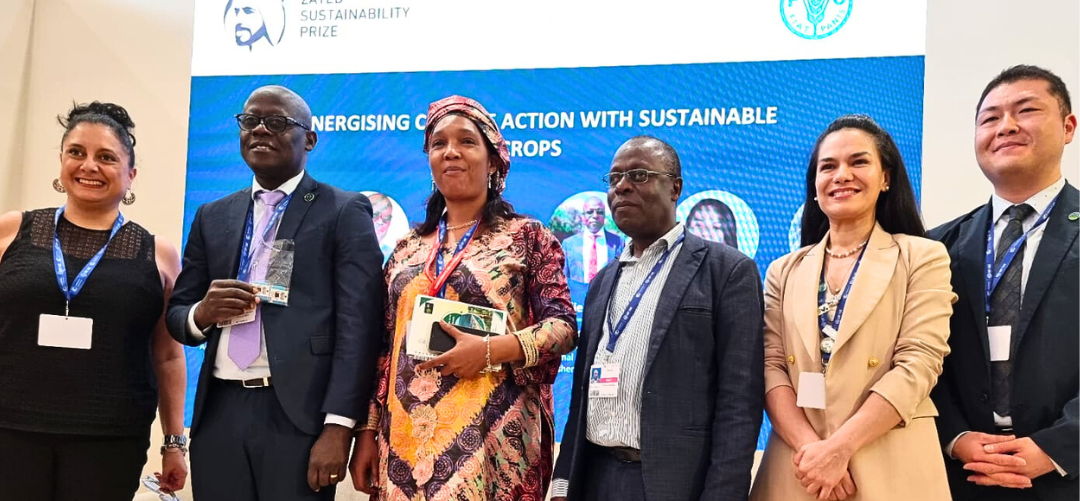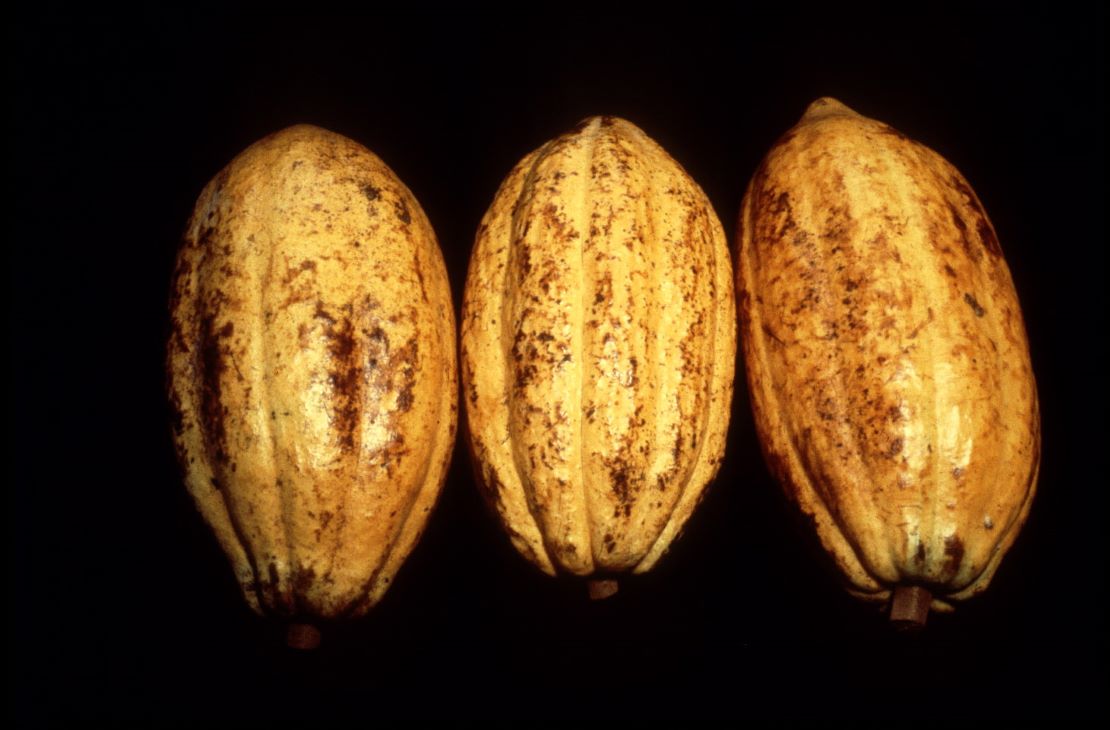FAO talks finance for better incomes, fewer emissions and more resilience at COP28

Energizing climate action with sustainable crops: How yerba mate, cocoa and peanuts boost incomes and cut emissions, with Maria Mercedes Proaño, Benjamin Kouame, Balkisou Buba, Dr. Freddie Kabango, Ethel Estigarribia, and Fumihiko Tominaga
©FAO
Can investment in climate projects make a difference in the lives of those who are most vulnerable to climate change? The answer was a resounding “yes” during separate side events led by the Food and Agriculture Organization of the United Nations (FAO) at COP 28 on 4 December and 10 December 2023.
Speakers from the public sector, farmers’ cooperatives and Indigenous Peoples’ groups gave their account of locally led climate solutions – supported by FAO in partnership with the Green Climate Fund (GCF) and the Global Environment Facility (GEF) – that are building resilience, boosting incomes and halting deforestation.
From increasing food security in conflict-affected countries to energizing climate action with sought-after commodities, here’s how investment in adaptation and mitigation action is improving people’s lives.
Climate action and finance to address food crisis in fragile and conflict-affected contexts
On Monday, 4 December 2023, representatives from Jordan, Somalia, Sudan and Yemen joined a roundtable discussion on the need to mobilize investment in actions that build climate resilience in the context of food, humanitarian, and environmental crises.
How are climate investment, conflict and agriculture connected? According to FAO, approximately one in every 33 people (258 million people) in 58 countries and territories faced acute hunger throughout 2023 because of armed conflicts, economic shocks, climate extremes, poverty and inequality.
Agriculture is a lifeline for about two-thirds of those experiencing acute food insecurity, but extreme weather events driven by the climate crisis and El Niño exacerbate economic instability and push more people into hunger.
In Jordan, for example, population pressure puts an enormous strain on scarce water resources. Speaking at the event, Jihad Alsawair, advisor to the Minister of Environment in Jordan, explained that a third of the country’s 11 million people are refugees.
“We’re doing our share,” he said, “but this problem is an international problem, and there should be an international solution, as well as international support.”
One of the climate solutions making a difference in the lives of rural communities in Jordan is an FAO supported, GCF-financed project with a budget of USD 33.2 million that focuses on increasing the country’s resilience to climate change by ensuring the long-term sustainability of its water management systems.
In conflict-affected countries like Yemen, climate change is not among the most pressing issues compared to education, health and humanitarian concerns.
“Everyone sees health conditions, and while the impacts of climate change are not seen, they are felt in the long term,” said Abdulwahid Arman, the Director of the Climate Change Unit at the Environment Protection Authority in Yemen. “Fragile countries need to effectively use climate finance channels to combat climate change and address interlinked food and water challenges.”
Responding to countries’ needs, FAO’s USD 1.2 billion-dollar GCF portfolio includes readiness projects in Burkina Faso, the Democratic Republic of Congo, Niger, Somalia, Syria, and Yemen, as well as a high-impact, cross-cutting project in Sudan aimed at restoring agroforestry systems with gum arabic trees and improving the livelihoods of poor, smallholder farmers.
Speaking on behalf of GCF, Carolina Fuentes, Director of Country Programming, acknowledged that “GCF has a responsibility to enhance access to climate investment and climate finance.” She also announced that a new GCF funding window will be available for least developed countries in March 2024, which supports Direct Access Entities and national coordination mechanisms through the readiness programme.
Energizing climate action with sustainable crops: How yerba mate, cocoa and peanut boost incomes and cut emissions
The power of investment to drive positive change was at the forefront of talks on how sustainable crops energize climate action on Sunday, 10 December 2023 in the Zayed Sustainability Prize Pavilion.
Speakers from Côte d’Ivoire, Paraguay and Uganda described how investment in sustainable cocoa, yerba mate and peanut crops are helping to transform the value chains of these prized commodities, making them more equitable, inclusive, efficient and sustainable.
In Côte d’Ivoire, cocoa is one of the country’s main exports and a major source of employment for poor farmers. A recent FAO report on the interactions between climate change and child labour in agriculture finds that the reliance on this major export crop has made cocoa farmers quite vulnerable, especially when the price of the crop falls significantly.
Despite the premium price consumers are willing to pay for cocoa and cocoa products, the farmers that grow cocoa beans see only a fraction of these profits: Cocoa farmers in Côte d’Ivoire and Ghana earn only 3 to 6 percent of a chocolate bar's retail market value.

The Cocoa tree bears fruit on its trunk and branches. The pods contain seeds which are called cocoa beans.
Poor cocoa farmers are also disproportionally affected by climate change. Warmer temperatures and less rainfall have led to reduced soil fertility and increased water scarcity, while unsustainable agricultural practices have reduced forest cover and degraded forest ecosystems.
Benjamin Kouame, an Ivorian cocoa producer and Fairtrade Africa Board Member, told event-goers that cocoa farmers are taking action to protect the forests they depend on for their livelihoods. He said, “We know that we can offer climate solutions through sustainable practices, and new ways of doing things.”
FAO is working with partners, including cocoa farmers' cooperatives to implement a USD 11.8 million dollar GCF project in Côte d'Ivoire that tackles deforestation and improves the livelihoods of vulnerable farmers by boosting zero-deforestation cocoa production.
Producing cocoa under dense, tropical forest canopies can help developing countries reduce their greenhouse gas emissions, conserve and protect biodiversity and at the same time generate income for small-scale cocoa producers.
Sustainable agroforestry practices are also key to producing yerba mate – a hugely popular, energy-boosting drink consumed throughout South America and cultivated by Indigenous Peoples in Paraguay.
Ethel Estigarribia from Paraguay’s Secretary of Environment said, “The implementation of the agroforestry model provides shade, windbreaks, biomass for energy purposes, conserves soils, stores carbon, supports small-scale agricultural production, and reduces the negative impacts of extreme weather events.”
Referring to the GCF-funded PROEZA project – a USD 90 million-dollar initiative supported by FAO and the Government of Paraguay – she added, “This project guarantees effective participation from all stakeholders, including women, Indigenous Peoples and local communities.”
Balkisou Buba, a representative of the GCF’s Indigenous Peoples Advisory Group, spoke about the role the Local Communities and Indigenous Peoples Platform plays in knowledge sharing. “This platform sets out to explore Indigenous Peoples’ knowledge as a solution to climate change alongside science and technology,” she explained.
On the subject of sustainable peanut crops – also known as groundnut or 'the poor man's nut' – Dr. Freddie Kabango from the Ministry of Agriculture, Animal Industry and Fisheries in Uganda said, “Farmer field schools implemented by FAO with support from the GEF can empower women and promote equity in the market economy.”
Fumihiko Tominaga from the GCF Secretariat said he was pleased to participate in the discussions and to hear how the projects GCF supports have been making an impact in different countries. "Food systems transition is a priority in GCF's updated Strategic Plan, and resilient value chains are key to addressing climate change and food security," he explained.
COP28 has wrapped up and we are still far from the net zero finish line, but climate action is making a difference in people's lives today.


